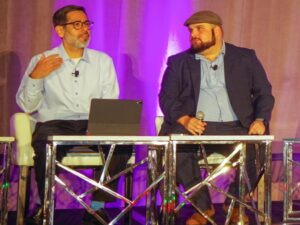5 tips for PR job seekers in a tough market
Even with the hardships created by the COVID-19 crisis there are still opportunities for communications pros to get started in a rewarding career.

Have you ever wanted to work for a PR agency, but didn’t know quite what they were looking for or how to tailor your résumé to suit? Or do you see opportunities in today’s rapidly evolving market but don’t seem to be getting the requisite attention from agencies or recruiters?
I was thinking about this a lot recently. I have changed careers on three different continents (North America, Europe, and Africa), taken an extended career break, looked for work during more than one recession, and spent hours adapting my résumé for countless opportunities. I know it can be challenging and frustrating even in the best of times.
So, when our boutique agency recently completed the process of hiring a new associate, I was reminded of everything I learned along the way. Here are five tips for PR career seekers during a challenging job market:
1. Are your skills a fit for the role?
Agencies take the hiring process very seriously and put a lot of work into developing a detailed job description that accurately reflects the position so candidates know exactly what the job will entail before taking the step to apply. While you will want to stretch yourself to find bigger roles, you need to ensure at least some of your existing skills are the right fit.
Countless résumés I’ve reviewed don’t come close to matching the stated qualifications for the position. Take the time to read all of the job description before determining whether to apply.
2. Know your audience.
In PR we stress the importance of knowing your audience before you pitch a reporter. The same rule applies when seeking a job. Take the time to research the company you are applying to and make sure your application reflects that knowledge. Though you may have a wealth of experience in SEO in the retail industry, for example, if the job in question is looking for an experienced media pitcher who understands security technology, you might need to rethink how you frame that experience.
It is imperative to draw a direct line between your qualifications and the featured services of the agency to which you are applying to be considered for the role.
3. Details and proofreading matter.
We evaluate each résumé we receive rather than using automation tools to streamline the process. This is time-intensive and means we take a very disciplined approach. There are certain no-no’s that will quickly disqualify a candidate. And in the business of communications, grammatical or spelling errors is one such non-starter. A core part of our service delivery is content development: media pitches, blogs, press releases, etc. The quality of that content is paramount to our clients and the reporters we work with. If an applicant’s résumé and cover letter contain errors, it doesn’t inspire confidence. Proof your résumé carefully, several times.
4. Skip the automation tools.
Speaking of automation tools, I know they exist for creating résumés as well as for evaluating them. I’ve already said we avoid the latter. I’d recommend you avoid the former, too.
To be candid, the quality of these automated résumés is often poor and riddled with formatting errors. Technology and automation have so many benefits, but when it comes to résumés, the personal touch matters. If you opt for one of these tools, use it as a base to build a résumé, don’t rely on it for the final product.
5. Cover letters can make or break it.
This might seem like an optional extra—or in some cases a little old-school. However, the cover letter is a must for us. While a résumé gives an overview of your qualifications, a cover letter provides depth and insight, revealing your personality, the level of interest and enthusiasm you bring and your writing style.
This is an applicant’s opportunity to stand apart and shine. Be sure to leverage that opportunity. And if an application specifically requests a cover letter, then send a cover letter. It isn’t optional.
A résumé is just the first step in the recruitment process, but it is a crucial one. You wouldn’t show up to an interview less than prepared, so treat your résumé in the same way. Spend the time to get it right and make it relevant. And remember before you send it, check it again, and again. Then one more time—just in case.
Trish Wainwright is COO of Plat4orm. A results-focused communications specialist with over 20 years of global corporate, technology and non-profit experience, she has extensively worked with high-profile clients including Microsoft, where she worked across a number of teams including Legal and Corporate Affairs, Anti-Piracy programs and Worldwide Public Sector.







Trish Wainwright: I loved reading your 5 tips for PR job seekers in a tough market. I could hear your voice in mine! I give the same tips to my candidates in job search mode. I still get too many cover letters and resumes with typos.
Our firm is in the recruiting business. We are not in the AI business. We also personally screen every resume that comes in.
I would also add these tips:
Highlight your accomplishments. Quantify and qualify as much as possible.
Don’t re-write your job description.
Include your “case stories” where you made a difference. You want your resume to stand out from the thousands of generic resumes we receive.